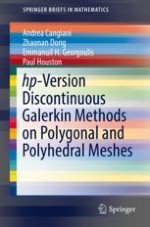Over the last few decades discontinuous Galerkin finite element methods (DGFEMs) have been witnessed tremendous interest as a computational framework for the numerical solution of partial differential equations. Their success is due to their extreme versatility in the design of the underlying meshes and local basis functions, while retaining key features of both (classical) finite element and finite volume methods. Somewhat surprisingly, DGFEMs on general tessellations consisting of polygonal (in 2D) or polyhedral (in 3D) element shapes have received little attention within the literature, despite the potential computational advantages.
This volume introduces the basic principles of hp-version (i.e., locally varying mesh-size and polynomial order) DGFEMs over meshes consisting of polygonal or polyhedral element shapes, presents their error analysis, and includes an extensive collection of numerical experiments. The extreme flexibility provided by the locally variable elemen
t-shapes, element-sizes, and element-orders is shown to deliver substantial computational gains in several practical scenarios.
